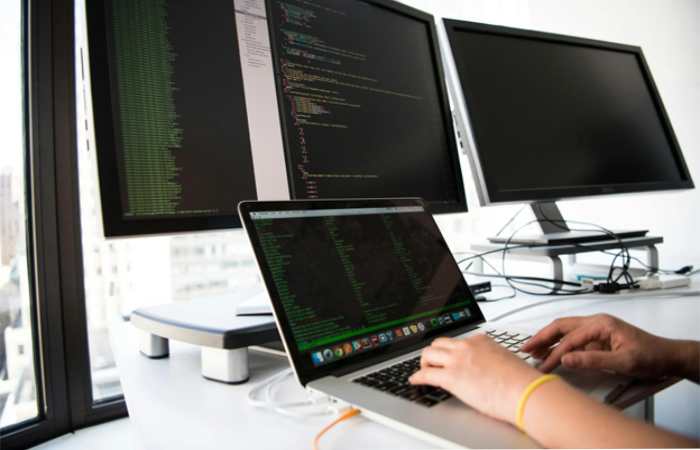
Blockchain Hackathon Ideas
Blockchain is fast becoming a key influence in various fields, revolutionizing data management and transaction processes. In 2023, the blockchain market was valued at about $17.57 billion, expected to surge at a 52.8% annual growth rate through 2032. This swift growth underscores a rising appreciation for blockchain’s ability to streamline operations and solidify data reliability, marking it as a pivotal technology for the future.
Hackathons focused on blockchain provide a vibrant platform for innovators to tackle real-world problems, fostering collaboration among developers, entrepreneurs, and enthusiasts. These events not only accelerate the development of cutting-edge applications but also promote a community spirit, encouraging participants to share ideas and insights that could shape the future of blockchain technology. Here are six blockchain hackathon ideas that could ignite creativity and innovation.
Decentralized Voting Systems
Think about how blockchain can reshape voting into a system that prioritizes clear visibility and strong security. The fundamental traits of blockchain support the development of voting frameworks where each vote is permanently recorded on a public ledger that can’t be altered.
This approach addresses typical voting problems like fraud and tampering by making sure every vote can be confirmed and the outcomes cannot be contested. These initiatives are ideal for every blockchain hackathon, showcasing practical uses and the technology’s benefits to society.
Blockchain-Based Identity Verification
Leveraging blockchain for identity checks can significantly lessen the risk of identity theft and fraud. This technique establishes a tamper-proof record of personal data, making impersonation exceedingly difficult.
The uses of this technology include secure airport check-ins and safe online transactions, providing a reliable way for both organizations and individuals to confirm identities without the risk of data manipulation or theft. Hackathons can serve as a platform for developers to enhance user interfaces and test the backend technology to ensure it performs well in real-world situations.
Supply Chain Transparency
The integration of blockchain technology could fundamentally alter the supply chain by embedding clarity at every stage. By employing a blockchain solution, each item can be monitored from its source to the final buyer, which guarantees product legitimacy, thwarts theft, and ensures adherence to both labor and environmental regulations. This improvement in accountability enables businesses to provide detailed product histories to customers who value transparency when making purchases.
At hackathons, developers dive deep into these projects, aiming to improve the transparency and dependability of supply chains. Such breakthroughs could sharply cut down on counterfeit goods, safeguarding brand reputations and consumer rights. This also adds a moral dimension to companies, which can heighten consumer trust and foster brand loyalty.
Tokenized Asset Management System
Tokenizing physical assets such as art and real estate can revolutionize asset management by making these markets easier to access and more efficient. A blockchain platform that lets users manage tokenized assets can speed up transactions and draw in smaller investors to markets usually dominated by the wealthy.
During hackathons, developers might focus on building secure platforms that manage these transactions while meeting regulatory requirements, thereby making investments in high-value assets more democratic. This approach could significantly reduce the barriers for new investors, creating opportunities for wealth generation that were once only available to a privileged few. Additionally, it increases liquidity in markets that traditionally have long investment periods.
Automated Compliance Framework
Navigating compliance is notoriously tricky, particularly in highly regulated sectors like finance and healthcare. A blockchain system that streamlines the compliance process could revolutionize how companies manage regulatory requirements. This system would keep a clear record of compliance data, making audits and regulatory checks easier while helping companies stay on top of their legal responsibilities.
Hackathons are perfect for creating these kinds of frameworks and could attract interest from various industries looking for better compliance solutions. Automating compliance means companies can redirect resources that used to go toward manual tasks into more strategic efforts, promoting innovation and gaining a competitive edge. Additionally, this approach reduces the risk of human mistakes, which could lead to significant legal complications and fines.
Peer-to-Peer Renewable Energy Trading
Picture a scenario where individuals trade renewable energy directly with each other, sidestepping the traditional power grid. This setup would utilize blockchain technology to ensure all transactions are safe and clear, helping users trust one another.
This approach could shake up conventional energy markets, promote renewable energy use, and allow communities to take charge of their own energy requirements. It’s particularly beneficial for areas rich in renewable resources but lacking the necessary infrastructure for energy distribution.
Final Thoughts
The blockchain ideas discussed are just the beginning of what can happen when creative thinkers address important issues. Every concept reveals new uses for blockchain and prompts us to consider its broader impacts on daily life.
As blockchain evolves, so does its potential to reshape our interactions across digital and real environments. Hackathons provide a unique platform for this transformation, allowing participants to not just watch but actively shape the future of blockchain applications.